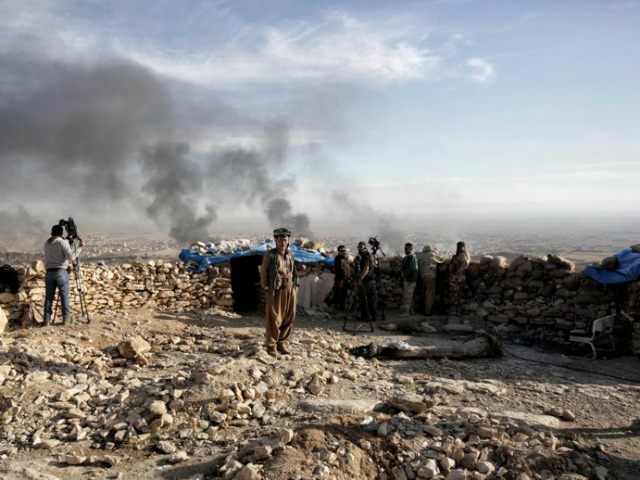Yazidi groups reported Turkish airstrikes on Tuesday in Sinjar, an Iraqi city once at the heart of the nation’s Yazidi population devastated in 2014 by the Islamic State’s attempted genocide of its residents.
Turkey has repeatedly targeted Sinjar for bombing because of the presence of members of the Kurdistan Workers’ Party (PKK), a Marxist, U.S.-designated terrorist organization that played a role in fighting the Islamic State in the area. The PKK helped local Yazidis establish a militia to prevent another attempted genocide and vowed in 2017 not to leave the area until Yazidis had full, stable control of Sinjar.
The Islamist government of President Recep Tayyip Erdogan considers all groups allied with the PKK – such as the Yazidi militia they helped establish, the Sinjar Protection Units (YPS), and the U.S.-allied Syrian Kurdish People’s Protection Units (YPG/YPJ) – terrorist organizations and has consistently violated both Iraqi and Syrian sovereignty to attack them. Local officials in Sinjar confirmed to the Kurdish outlet Rudaw that airstrikes had occurred in the area.
“Khudeda Chuke, mayor of Sinune town, says a vehicle belonging to the Shingal Protection Units (YBS), a Yezidi armed group affiliated with the Kurdistan Workers’ Party (PKK) was hit in the vicinity of Bahraviyan village, seven kilometres west of the town of Khanasor,” Rudaw reported. Chuke said no casualties had occurred, but that the militia lost some equipment.
Kurdistan 24, an Iraqi Kurdish outlet, reported that another airstrike occurred late Tuesday that killed two civilians, citing “Iraq’s top security source.” The strike occurred in another village in Khanasor.
Members of the YBS issued an official statement confirming only that airstrikes occurred, but not offering any details, instead saying they would clarify what happened at a later date when they could fully assess the situation.
Turkey’s state-run Anadolu news agency confirmed Turkish military activity in Iraq on Tuesday, but claimed that the military had “neutralized” two “terrorists” in northern Iraq generally. “Neutralize” is a term Ankara typically uses that includes both those killed and removed from battle through arrest.
“The operation was carried out in the Zap region, across Turkey’s border, where the terrorists were planning an armed attack, according to a ministry statement,” Anadolu reported.
The Turkish Defense Ministry also claimed on Tuesday that it had destroyed PKK ammunition in “terrorist hideouts” in the area. Anadolu described the seizure as part of “Operation Claw-Eagle,” a military invasion of Iraq that Turkey launched in mid-June. Claw-Eagle consists of airstrikes on areas of Iraq that the Turkish government believes the PKK is active in, including areas like Sinjar, still largely destroyed after the Islamic State occupation there in 2014. The Turkish Defense Ministry claimed in June that Operation Claw-Eagle was necessary “to ensure the security of the Turkish people and the country’s borders by neutralizing the PKK and other terrorist organizations that have been stepping up harassment and attack attempts against the police and military bases.”
The bombing of Sinjar on Tuesday was the first of its kind since the first round of Claw-Eagle attacks in June, Rudaw noted, adding that it has documented the deaths of at least eight civilians at the hands of the airstrikes. After the first airstrikes, PKK news sources claimed that Turkey had bombed a hospital and refugee camp, not locations of military significance.
The few minority Christians left in the Sinjar area also protested following the first airstrikes that Turkish airstrikes were targeting their homes. Rudaw quoted a local Christian named Faiza Rahim saying in June that Turkish airstrikes blew up his car and that local Christians were “all terrified by the bombing, including children, women, men, and elderly.”
Turkey also launched an adjacent “Operation Claw-Tiger” operation in northern Iraq in June, a ground invasion of Iraq, prompting objections from both residents of northern Iraq’s autonomous Kurdistan Regional Government (KRG) and the Iraqi government in Baghdad.
Sinjar faced the brunt of the Islamic State’s attempt to commit genocide against the Yazidi people in 2014. The invasion forced the residents of what was then Sinjar city to choose between confronting ISIS terrorists as they entered the city or fleeing to Mount Sinjar, which looms over the city. Many chose the latter, braving the dry mountain in hot August weather with no food or water. Many died of starvation, even as helicopter rescue missions came to try to fly them off of the mountain without having to come back down and face the jihadists.
When Kurdish forces finally defeated ISIS in Sinjar, they returned to rubble, mass graves, and little else. Bringing electricity or basic utilities to Sinjar was impossible even a year after the Islamic State left. Jihadists left booby traps and mines throughout the city to kill those returning should they lose control.
“Six years on, up to 200,000 Yazidis are still displaced. Some are still facing harsh conditions on Mount Sinjar, where they fled to escape, while the majority live in camps for internally displaced persons in the Kurdistan Region of Iraq,” the U.N. Development Programme noted in early August. “In addition to the human catastrophe, ISIL destroyed up to 80 percent of public infrastructure and 70 percent of civilian homes in Sinjar City and surrounding areas, as well as many important religious sites.”

COMMENTS
Please let us know if you're having issues with commenting.